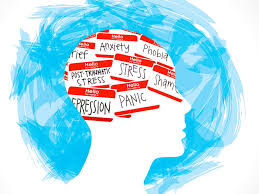43.8 million Adults experience mental illness each year, that’s a high prevalence of mental illness. Why is it something we are still afraid to talk about? We pay attention on our physical problem or illness and we often forgets or not realize but mental illness is among the number one cause of disabilities in our country.
Depression, number one cause of disability worldwide. Suicide rates continue to climb among the Adults, Adolescent, and even children. Every year we see the loss of celebrities and prominent figure to suicide, we are still not courageous enough to talk about mental illness. Even for the most open minded, judgment is a natural part of our human condition, however when our judgment exceed to discrimination, prejudice even hostility, it becomes the breathing ground for stigma. Stigma defined as a mark of disgrace as a result of stereotypes and misunderstandings. In our society, mental illness is stigmatized more than any other illness or condition. We can see examples of stigma every single day and we might not even realize what stigma looks like. Read the news, turn on the news, scroll through social media, hear conversation on the street or at work, you are bond to hear an example of stigma, you might not even realise it and it creates a bigger burden of untreated mental illness for our society and our healthcare resources.
There are many factors that contribute to the onset of mental illness, biological, environmental, social, genetic, stress, trauma; we still not quite understand the inner play of all of these in our brain. You can’t see it, it must not be real, and this thinking leads to lots of misunderstandings, like, that people with mental illness can control it and snap out of it or that those people who can’t control or come out must be weak or lazy or stupid or have other personality flaws. Now other stereotype begins to form because of these misunderstanding is fear. And this fear forces them to stay away from the people and they get isolated and instead of expressing their trouble and situation they thinks that it is a matter of shame if anyone knows. This leads to more and more and more depression and illness.
But mental illness is treatable- if people seek help. Sometimes people see it as a weakness. It is difficult to come to someone else and say I need help; I can’t do this by myself. I should be able to handle this. I should be able to do it differently. I must be weak because I am not. Everyone experience things differently and cope with things differently. Health experts say finding healthy coping skills is important to your overall health. We can change our perception. Sometime the only thing we have control over is how we view a situation and how we choose to react to it. Adding a physical activity, talking to someone, and taking time for yourself are a few positive ways to help you cope. There is a difference between ‘me time’ and isolation. That line between what is ‘me time’ and what is isolation differs for each person. While dealing with things like anxiety, depression, or post traumatic stress disorder, it can be difficult to see the impact it’s having on those around you. Most times those around you will notice changes before you are aware of them. Whether it is, your facial expression are different, you seem sadder, you seem not liking yourself. Taking the time to acknowledge how you feel and practice healthy coping skills can help to improve mental health.
The simple solution, at least the first step to deal with mental illness is, if we as a community can talk about mental illness in a respectful and real way, we can start to break that psycho. Education about what mental illness is and what it isn’t can challenge people misconception and stereotypes. On a personal level we can put aside our own prejudice and our own false believes and simply show empathy to those and their family that are dealing with mental illness, it doesn’t take much to do this. Also start to see people with mental illness aren’t any different than you and me. Isn’t it time we stop the stigma, it may just start with the hand shake.
Author: Pratyaksha, From IMS Law College, Noida.


